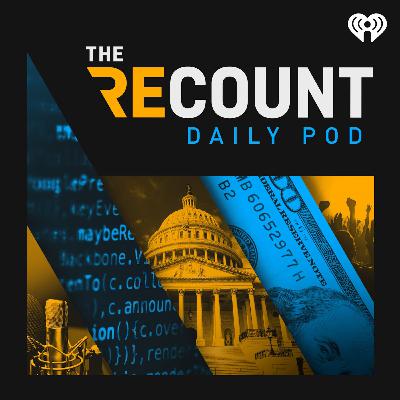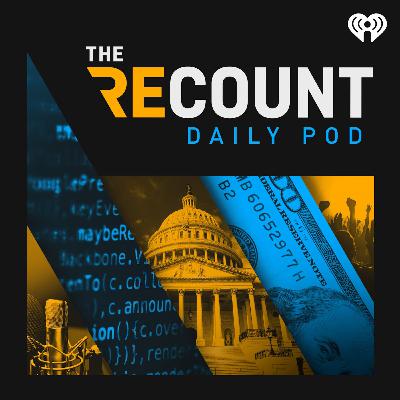Discover The Recount Daily Pod
The Recount Daily Pod

The Recount Daily Pod
Author: iHeartPodcasts and The Recount
Subscribed: 37Played: 1,714Subscribe
Share
2026 iHeartMedia, Inc. © Any use of this intellectual property for text and data mining or computational analysis including as training material for artificial intelligence systems is strictly prohibited without express written consent from iHeartMedia
Description
Just like The Recount is the can’t-miss news source on Twitter, The Recount Daily Pod is the morning news source you’ll want to plug into every day. Hosted by journalist Reena Ninan, each episode breaks down important information in politics, tech, business and culture. Ninan interviews journalists who break news and give listeners the crucial context necessary to understand why these stories are important.
70 Episodes
Reverse
The journalist Cokie Roberts left behind a tremendous legacy when she passed away in 2019. Her late husband Steven Roberts, who is also a journalist, grieved and honored her in his own way — by reporting on Cokie's life and work at organizations including NPR and ABC, and writing a book about it. "Cokie: A Life Well-Lived" chronicles the career, values, and personal faith of a journalist who proved to many other women that they had a place in the newsroom. Learn more about your ad-choices at https://www.iheartpodcastnetwork.comSee omnystudio.com/listener for privacy information.
Severe staff shortages at Georgia prisons have contributed to a huge spike in violence, including at least 44 likely homicides since last year. In September, the Department of Justice opened an investigation into the violence and possible constitutional violations by the correctional system. Separately, a lawsuit filed by the Southern Center for Human Rights called the prison conditions “abysmal.” Sara Totonchi is the organization’s executive director, and Atteeyah Hollie is an attorney there. They join the podcast to shed light on the crisis. Learn more about your ad-choices at https://www.iheartpodcastnetwork.comSee omnystudio.com/listener for privacy information.
Climate envoy John Kerry described it as “the last best chance the world has" — this weekend world leaders and thousands of negotiators, journalists, and activists converge on Glasgow for COP26, the 2021 United Nations Climate Change Conference. In the span of two weeks, can world leaders pull off what they never have, committing to realistic carbon-cutting policies in order to limit the planet's disastrous warming? Those who fear the worst may be familiar with the feeling of “eco-anxiety.” Caroline Hickman — a practicing psychotherapist and board member of the Climate Psychology Alliance — defines the phenomenon... and tells us what we can do about it. Learn more about your ad-choices at https://www.iheartpodcastnetwork.comSee omnystudio.com/listener for privacy information.
George Will was the first political columnist to call for President Richard Nixon’s impeachment, and he's lent a leading conservative voice to the Washington Post and other publications ever since. Most recently, he’s out with a collection of his work — "American Happiness and Discontents" — first published between 2008 and 2020. He joins the podcast to talk about polarization in America; former President Donald Trump's hold on the Republican Party; and a column he wrote about his son, Jonathan Will, who is living a full life with Down syndrome. Learn more about your ad-choices at https://www.iheartpodcastnetwork.comSee omnystudio.com/listener for privacy information.
Andrew Yang drew attention to universal basic income as a Democratic candidate in the 2020 presidential election, and earlier this year in his run for mayor of New York City. Since then, he’s announced he’s leaving the Democratic Party to start a new one. The Forward Party will back certain candidates — Democrats and Republicans alike, Yang says — in favor of open primaries and ranked-choice voting, two policies he believes would free politicians from appealing to the extremes and “give rise to a more vibrant, dynamic, multi-polar democracy.” Learn more about your ad-choices at https://www.iheartpodcastnetwork.comSee omnystudio.com/listener for privacy information.
More than 40 million Americans are in debt for getting an education. The federal government holds $1.6 trillion in student loan debts, a sum roughly on par with Canada’s GDP. President Biden has canceled billions of dollars of debt, but plenty more remains. Plus, a freeze on payments, put in place by President Trump at the start of the pandemic, expires in late January. Unless Biden extends it, as he has done before, loan repayments will be coming due again. How did the student debt crisis in the U.S. get so bad in the first place, and what can we do about it? Persis Yu, staff attorney at the National Consumer Law Center and Director of the Center’s Student Loan Borrower Assistance Project, joins the podcast to explain the problem — and possible solutions. Learn more about your ad-choices at https://www.iheartpodcastnetwork.comSee omnystudio.com/listener for privacy information.
In 2013, Mark and DeAnne Stidham founded LuLaRoe, a multi-level marketing firm that still sells women's clothing today. Pushing a feminist image, the company claims to give women the opportunity to become independent retailers. But it's faced plenty of lawsuits, including one from the state of Washington accusing it of operating a pyramid scheme. Amazon's documentary series "LuLaRich" uncovers the company's glamorous rise and empty promises, including through a sit-down interview with the founders themselves. Directors Jenner Furst and Julia Willoughby Nason join The Recount Daily Pod to tell the story. Learn more about your ad-choices at https://www.iheartpodcastnetwork.comSee omnystudio.com/listener for privacy information.
Nearly two years into the pandemic, the U.S. is seeing a sustained drop in new COVID cases. And recent forecast models by researchers advising the CDC suggest we could see a steady decline in cases throughout the winter and into spring, rather than a seasonal surge. Is the country really edging toward an end to the crisis? Two leading voices in COVID research and analysis — Dr. Bill Ku (retired scientist and a former senior lecturer and researcher at Columbia University), and Dr. Eric Feigl-Ding (epidemiologist and senior fellow at the Federation of American Scientists) join The Recount Daily Pod to catch us up on where we stand with COVID today. Learn more about your ad-choices at https://www.iheartpodcastnetwork.comSee omnystudio.com/listener for privacy information.
Surprise: very little of the plastic you dutifully put in your recycling bin ends up actually being used again. The costs to successful recycling are prohibitive. And even then, recycling is a market with fewer and fewer buyers. So how can we really cut down on waste? Michael Cyr is the co-founder of Cup Zero, a company that seeks to cut down on waste, starting with all those cups we use and throw away at public events. He joins The Recount Daily Pod to break it all down for us. Learn more about your ad-choices at https://www.iheartpodcastnetwork.comSee omnystudio.com/listener for privacy information.
A presidential assassination, a devastating earthquake and criminal gangs engaging in mass kidnappings. The problems plaguing Haiti today are many — and they’re often misunderstood. How can the U.S. and the international community help bring stability and economic renewal to the country? Garry Pierre-Pierre, founder and publisher of The Haitian Times, joins The Recount Daily Pod to share his insights. Learn more about your ad-choices at https://www.iheartpodcastnetwork.comSee omnystudio.com/listener for privacy information.
The iconic Miss America pageant turned 100 this year, having crowned dozens of women who proudly went on to represent the institution across the U.S. But the contest was not without its controversies, including years of forcing women to walk across the stage in swimsuits. Is Miss America still relevant? Today we're talking with Amy Argetsinger, editor and staff writer for the Washington Post and author of "There She Was: The Secret History of Miss America." Learn more about your ad-choices at https://www.iheartpodcastnetwork.comSee omnystudio.com/listener for privacy information.
The pandemic has exposed glaring inequalities in the healthcare industry. From access to medicine and providers to a lack of trust between doctors and patients, COVID revealed that systemic racism has a dramatic impact on the health and well-being of minority communities. What can be done to fix this? Dr. Elaine Batchlor, CEO of MLK Community Healthcare, joined us to share her experiences and insights. Learn more about your ad-choices at https://www.iheartpodcastnetwork.comSee omnystudio.com/listener for privacy information.
The infamous prison camp at the US Navy Base in Guantanamo Bay, Cuba, was opened in early 2002 to house alleged terrorists the U.S. apprehended in Afghanistan. The camp became notorious as a symbol of U.S. human rights abuses. President Joe Biden has pledged to finally close it. Will he succeed? Karen Greenberg, Director of the Center on National Security at Fordham Law, joins us today to break it all down. Learn more about your ad-choices at https://www.iheartpodcastnetwork.comSee omnystudio.com/listener for privacy information.
Line 3, a once-decommissioned oil pipeline, was put into operation again earlier this month. The $4 billion dollar project, announced in 2014, met with fierce opposition from both environmentalists and Indigenous American tribes. Now, it's transporting over 600,000 barrels of oil per day from Alberta, Canada, to the American Midwest. Nick Martin, editor of the Indigenous Affairs desk at High Country News — and a member of the Sappony Tribe of North Carolina — joins us to dig into it. Learn more about your ad-choices at https://www.iheartpodcastnetwork.comSee omnystudio.com/listener for privacy information.
Facebook was all over the news this week for good reason: They knew they were harming our kids and they did it anyway. An explosive series published by The Wall Street Journal last week revealed the extent to which Facebook maintained silence while fully aware that flaws in its platform were hurting its users. Georgia Wells, one of the authors of that series, joins us to share her thoughts. Learn more about your ad-choices at https://www.iheartpodcastnetwork.comSee omnystudio.com/listener for privacy information.
One of the few Trump administration policies that President Joe Biden has kept in place is a tough approach toward China. For one, Trump's tariffs are still in place. But China's recent military demonstrations against Taiwan haven't helped ease tensions. What does the future hold for US-China relations? Yukon Huang, a senior fellow in the Asia Program at the Carnegie Endowment for International Peace, joins us to share his insights. Learn more about your ad-choices at https://www.iheartpodcastnetwork.comSee omnystudio.com/listener for privacy information.
Gun violence has risen to alarming new heights in recent years, becoming the leading cause of death for children since 2018. What can we do to keep our children safe? Nicole Hockley, co-founder and managing director of Sandy Hook Promise, joins us to share her insights. Learn more about your ad-choices at https://www.iheartpodcastnetwork.comSee omnystudio.com/listener for privacy information.
When New Yorker Staff Writer Evan Osnos, a veteran foreign correspondent, returned to the U.S. in 2013 he found a country that was unrecognizable from the one he'd left 11 years earlier. Suddenly, it was a place with deep political fissures and little to no common ground. Evan's new book "Wildland: The Making of America's Fury" is the result of his efforts to explain what had happened. Learn more about your ad-choices at https://www.iheartpodcastnetwork.comSee omnystudio.com/listener for privacy information.
On September 15th, the first all-civilian spaceflight took off from Cape Canaveral, Florida. The commercial mission run by SpaceX successfully reached orbit and splashed down in the Atlantic three days later. Could the future of spaceflight be within reach for the non-wealthy? Christian Davenport, staff writer at The Washington Post, joins us to break it all down. Learn more about your ad-choices at https://www.iheartpodcastnetwork.comSee omnystudio.com/listener for privacy information.
Big Tech wields enormous power in today's global economy, from driving advances in technology to influencing our political and cultural conversations. Should that power be more tightly regulated and if so, how? Cat Zakrzewski, technology policy reporter at The Washington Post, joins us to share her insights. Learn more about your ad-choices at https://www.iheartpodcastnetwork.comSee omnystudio.com/listener for privacy information.




















